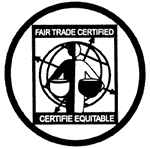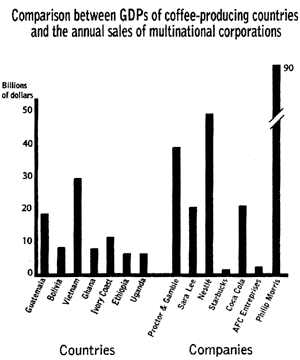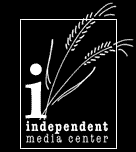|
Good to the Last Drop?
Crisis for Coffee
Growers Mandates Consumer Response
by Meridith Kruse
 Since
returning from Nicaragua I have closely followed the
news from that region. The news has not been good. During
the summer of 2000, I stayed with a family in Matagalpa
who lived in a small wooden shack set in the thick green
mountainside. The juxtaposition of extreme poverty alongside
rich, fertile land stood as a vivid reminder that the
legacy of colonialism and its modern manifestation, corporate
exploitation, continues to severely constrict the lives
of those living in Latin America today. Since
returning from Nicaragua I have closely followed the
news from that region. The news has not been good. During
the summer of 2000, I stayed with a family in Matagalpa
who lived in a small wooden shack set in the thick green
mountainside. The juxtaposition of extreme poverty alongside
rich, fertile land stood as a vivid reminder that the
legacy of colonialism and its modern manifestation, corporate
exploitation, continues to severely constrict the lives
of those living in Latin America today.
In the mornings I would walk with the children to a nearby
river, and carry buckets of water to pour over rows of
coffee plant seedlings. The children told me that it would
be four years before the plants began to produce a crop.
I wondered what, after years of painstaking care to produce
this first crop, would be the compensation for their labor.
From all I have read and seen, suffering and starvation
may well be their only reward.
On Tuesday, August 28, 2001, a headline in the Seattle
Post read, "Weak from Hunger, Nicaraguan Peasants
Flee the Fields." The article traced the journey
of 480 campesinos who, fired from their jobs at Los Milagros
coffee plantation, joined hundreds of others in a mass
exodus from coffee-dependent communities. Across the country
coffee refugees, without work and desperate for food,
congregated in makeshift camps and wondered what to do.
Despite promising rhetoric during the recent Presidential
elections in Nicaragua, little has changed for the coffee
growers.
Coffee is the second largest US import after oil, and
the United States consumes one-fifth of the world's coffee,
making it the single largest coffee consumer in the world.
But few Americans realize that agricultural workers in
the coffee industry often toil in what can be described
as "sweatshops in the fields." The average coffee
farmer earns less than $3.00 per day, less than what most
Americans spend on coffee per day, and often less then
the cost of growing it, forcing the farmer into a downward
spiral of poverty and debt.
What has conspired to create this crisis? Many factors
are at work. One that stands out is the push by the World
Bank to invest heavily in Vietnamese coffee, which has
in turn created a surplus in the market and left wholesale
prices for coffee in a tailspin. In 1996 the wholesale
price for Arabica coffee (high-grade coffee grown in Nicaragua)
was $3 per pound, while today a pound sells for 51 cents.
Worldwide wholesale coffee prices are currently well below
the cost of production, causing massive unemployment and
starvation among growers. Yet the average retail price
for roasted coffee remains high. What gives?
 Under
the "free trade" economic model, so-called "developing"
countries that are desperate for money appeal to the World
Bank for assistance. Loans are granted, but only if certain
conditions are met by the recipient country. These conditions
include cutting social spending, privatizing the economy,
eliminating regulations on foreign ownership of resources
and businesses, eliminating tariffs, and re-orienting
the economy from subsistence to exports. The "free
trade" system is based on the mythology that if a
country makes itself as hospitable as possible to foreign
investment, even when this means weakening environmental
and labor codes and prioritizing export commodities over
food security, economic growth will occur. Unfortunately,
the only thing that generally grows is the wealth of the
multinational corporations, many of whose annual sales
are greater than the entire Gross Domestic Products of
the coffee-producing countries. "Free trade"
is a bankrupt model that has led to greater economic inequality,
environmental degradation, and social unrest throughout
the world. Not surprisingly, George Bush's administration
continues to promote this failed policy with the Central
American Free Trade Agreement. So long as our nation's
leaders continue down this misguided path, it is up to
us as ordinary citizens to propose, create, and demand
an alternative. Fair Trade offers us the opportunity to
do just that. Under
the "free trade" economic model, so-called "developing"
countries that are desperate for money appeal to the World
Bank for assistance. Loans are granted, but only if certain
conditions are met by the recipient country. These conditions
include cutting social spending, privatizing the economy,
eliminating regulations on foreign ownership of resources
and businesses, eliminating tariffs, and re-orienting
the economy from subsistence to exports. The "free
trade" system is based on the mythology that if a
country makes itself as hospitable as possible to foreign
investment, even when this means weakening environmental
and labor codes and prioritizing export commodities over
food security, economic growth will occur. Unfortunately,
the only thing that generally grows is the wealth of the
multinational corporations, many of whose annual sales
are greater than the entire Gross Domestic Products of
the coffee-producing countries. "Free trade"
is a bankrupt model that has led to greater economic inequality,
environmental degradation, and social unrest throughout
the world. Not surprisingly, George Bush's administration
continues to promote this failed policy with the Central
American Free Trade Agreement. So long as our nation's
leaders continue down this misguided path, it is up to
us as ordinary citizens to propose, create, and demand
an alternative. Fair Trade offers us the opportunity to
do just that.
As an alternative to unregulated "free trade",
a Fair Trade certification system has been developed which
assures consumers that the coffee they drink was purchased
under specified Fair Trade conditions. To become Fair
Trade certified, an importer must meet stringent international
criteria: pay a minimum price per pound of $1.26, provide
much- needed credit to farmers, and offer technical assistance
such as help in transitioning to organic farming. Fair
Trade coffee is grown by approximately 300 farmer cooperatives
in over 20 countries across Latin America, Africa, and
Asia. According to TransFair, a non-profit third-party
certification organization, in 2001 more than 550,000
farmers and their families earned a decent living in democratically-run
Fair Trade certified cooperatives.
Wishing to support this effort, the Common Ground Food-Co-Op,
a program of the Illinois Disciples Foundation, began
work on a local Fair Trade Coffee Campaign in February
of 2002. Since then we have produced a brochure to educate
community members about the importance of Fair Trade.
We are also in the process of creating a Champaign-Urbana
Fair Trade Coffee Guide, which will list the addresses
of local coffeehouses and bulk suppliers who offer Fair
Trade Certified coffee. Equipped with this guide, both
consumers and retailers will be empowered on a local level
to participate in the creation of a more just global economy
by purchasing only Fair Trade Certified coffee.
In addition, we will be sponsoring an educational forum
on Fair Trade at the Illinois Disciples Foundation on
May 1, International Workers Day. Keynote speaker for
the event will be Jim Goetsch, a longtime Fair Trade activist
with Friends of the Third World. Jim attended the first
Alternative Trading Conference in 1977, helped found Three
Rivers Co-Op in Indiana, and in 1983 helped organize the
first importing of "fair trade" from Nicaragua
as a protest against the Reagan/Bush embargo. Jim continues to work with Friends of the Third World, which partners
with 80 grassroots cooperatives in 40 countries.
to work with Friends of the Third World, which partners
with 80 grassroots cooperatives in 40 countries.
As you can see, we have ambitious goals for the upcoming
month and hope you will join us in promoting this campaign.
If you would like to learn more about how you or your
organization can become involved in the local Fair Trade
movement, please call 352-8721 and ask for Jill, Meridith,
or Jamie.
Meridith Kruse is the Executive
Director of the Illinois Disciples Foundation
|
|






